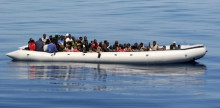Migrant boat disasters in the Mediterranean: address the root causes, not patch-up solutions

Some of the dead were children between the ages of 10 and 12. This was the worst incident so far in the Mediterranean. The boat is said to have had 950 people on board, many of them were Syrians, Eritreans and Somalians and various other nationalities.
At the same time, a fragile wooden boat with more than 80 people aboard ran aground off the Aegean island of Rhodes. Greek authorities reported at least three people were killed, including a child.
The incidents came just days after 400 migrants drowned last week in a similar accident. It is estimated that at least 1,500 migrants have died in the Mediterranean Sea in 2015.
“There is a genuine migration crisis in Europe. Yet European Union governments refuse to face this, nor are they taking a bold step to address the problem collectively and comprehensively,” says Rosa Pavanelli, General Secretary of Public Services International (PSI), a global trade union federation representing public service workers. “Migrants are coming to Europe because they are fleeing from persecution, conflict and poverty. They do not see any hope of survival in their home countries, so they undergo the dangerous journey to Europe. It is a cry for help, yet government leaders do not hear them,” says Pavanelli. “Instead of acknowledging the harsh social and economic conditions in the countries where these migrants come from and investing in social policies to address the root causes, receiving country governments are responding yet again with security measures and military operations to address migration and asylum,” she stresses.
“It is not acceptable that the EU uses bilateral agreements to prevent migration flows from Africa, especially when such agreements are signed with dictators as it happened five years ago with Libya, or as it risks to happen again with Eritrea,” adds Pavanelli.
PSI has been campaigning for good governance, decent work, fair trade, tax justice and access to quality public services for all, so that migration becomes an option and not the only choice. It is also working with affiliates to build the capacity of public service workers, who are at the frontline of providing services to migrants.
On Monday, EU Governments held emergency talks in Luxemburg and resolved to launch military operations against the network of smugglers in Libya deemed responsible for smuggling the migrants across Mediterranean. The meeting also agreed to expand the Frontex operation, which is the EU border patrolling agency.
“The EU has a humanitarian duty to save the lives of people fleeing war and poverty. The European trade union movement is opposed to security measures alone to solve Europe’s recurrent migration and asylum crisis. Last year, we warned EU governments and institutions against stopping Mare Nostrum, the search and rescue missions in the Mediterranean. Until governments take on bold steps to come up with a comprehensive approach, these tragedies will continue,” says Jan Willem Goudriaan, General Secretary of the European Federation of Public Service Unions (EPSU), PSI’s European organisation. “The Extraordinary Council meeting on Thursday 23 April must agree on an international protection programme, with urgent measures to derogate from the current EU asylum rules including the Dublin Conventions,” concludes Goudriaan.

